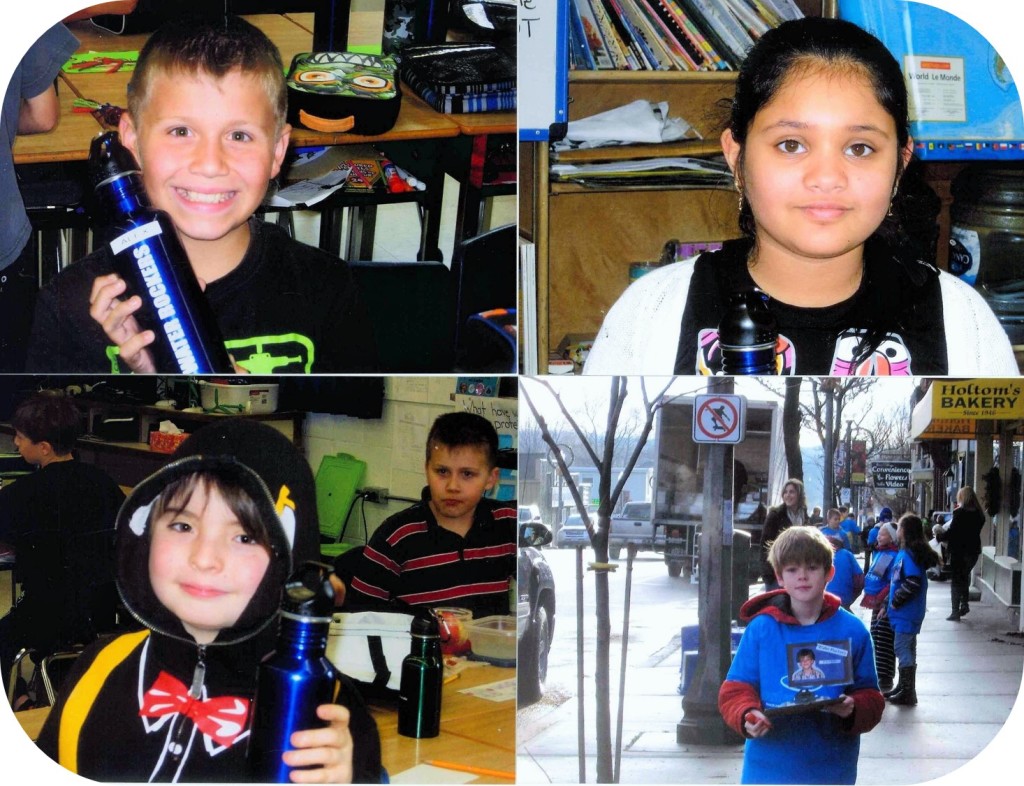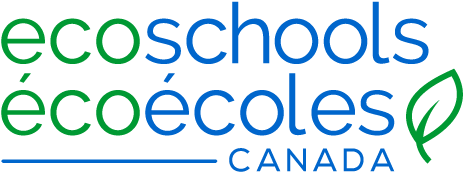Every month, students in Cathy Dykstra’s grade 5 class put on their “Water Rockers” t-shirts, walk down Main Street, and visit the stores and restaurants in the town of Erin to promote environmental awareness.
The students have persuaded 100% of the 50 downtown businesses to participate in the “BLUE W” program. To participate, stores put “BLUE W” stickers in their windows letting the public know they’ll refill reusable bottles for free with tap water.
 This is part of a broader school focus on waste minimization, and it teaches business and leadership skills too. Students learn to shake hands, look business owners in the eye and make short presentations about water conservation. It is a great example of a “service learning” initiative where the students feel valued by their community.
This is part of a broader school focus on waste minimization, and it teaches business and leadership skills too. Students learn to shake hands, look business owners in the eye and make short presentations about water conservation. It is a great example of a “service learning” initiative where the students feel valued by their community.
“The store owners are amazing,” says Dykstra, “It shows how much people care about the environment. They’re happy to know that the kids are not just learning facts, but learning that they can do something about the facts.”
Karen Acton, the Upper Grand DSB Environmental Sustainability Lead calls this “positive activism”.
Back at school, one wall is covered with photos of students and staff drinking out of refillable water bottles, many of them showing the student-chosen slogan: “Erin: our local water rocks!” These bottles, designed by the school, have been sold to the school community and in downtown stores for the last three years. The bottles were even part of a fundraising campaign last spring when the Erin Town Council partnered with the school to help get bottle refill stations (just like the ones at Erin PS) installed in two local arenas.
Waste minimization means more than just water bottles at Erin P.S. The school has reduced its daily garbage output by more than 87% in the past six years. They’ve done this by holding Waste-Free Wednesdays, running student-led composting and recycling programs, and holding competitive waste-reducing challenges.
The school has weighed its garbage once a week for the last six years. Students rigorously chart their progress on big bar graphs in the front hall of the school. Back in 2010, the lowest recorded amount of garbage in one day for the grade 7 and 8 students was 18.5 kg. Last year, that same division celebrated a new daily record, producing only 900g of garbage in one day. The school’s record goes to the Junior Division, which produced a one day total of 150g of garbage.
Erin Public School saves energy too by turning off computers, photocopiers, and classroom lights when not in use, and by holding an Earth Hour each month during which everything gets switched off in the building. And starting soon, the school will be tracking its energy use with UGShare, the Upper Grand DSB’s online staff portal that lets schools access their monthly electricity and gas consumption data.
Principal Peter LeBlanc welcomes new students by stating that Erin P.S. is a very proud EcoSchool and that all students are expected to be as waste-free as possible and to use reusable bottles every day. Then he hands them a brand new Erin bottle as a gift.
| The Erin Habitat As a five year gold-certified EcoSchool, Erin P.S. participates in many other activities alongside energy conservation and waste minimization. Eco activities are embedded in many classroom programs. Most striking is the area in front of the kindergarten rooms, where floor space has been transformed into a giant model of an ecological habitat created by the school’s youngest students. By creating a model from paper tubes, cardboard buildings, and plastic cows, horses, and giraffes, the students learn about natural and built environments and can experiment with the impacts of habitat loss. Grade seven and eight students have partnered with the kindergarteners as well, and use this amazing habitat for their own research and discussions. |

Recent Comments